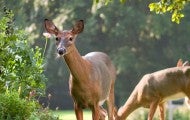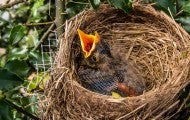WASHINGTON - The Humane Society of the United States released today the results of a disturbing undercover investigation into two wildlife killing contests in Frederick County and in Waldorf, Maryland. Investigators documented the judging portions of the events, with participants lining up rows of...
Today, the New York state legislature passed a bill that ends inhumane wildlife killing contests, in which participants compete to kill the most, the heaviest and the smallest animals for cash and prizes. In 2018 and 2020, the Humane Society of the United States released undercover investigations...
It's a myth that going outside is a requirement for feline happiness. Playing regularly with a cat and providing their entertaining toys can easily satisfy their stalking instinct, keep them stimulated and provide the exercise they need to stay healthy and happy. It also keeps local wildlife safe...
To protect their pets, many owners turn to microchips. Microchips are tiny transponders, about the size of a grain of rice, that can be implanted under your pet’s skin by most veterinarians and animal shelters; some shelters implant chips in all pets they place. A microchip isn’t the same as a GPS...









